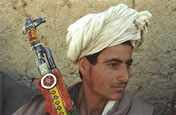          
VIDEO
 56k | 100k | 300k
Schoolgirls, Taha Koshan
56k | 100k | 300k
Schoolgirls, Taha Koshan
Peshawar, September 1987
|
 |
 ||
 No single word can capture the complex meaning of honour in Afghan culture. Honour involves defending personal reputation, gaining the respect of one's peers, and preserving the sanctity of the home. When the Soviets crossed into Afghanistan, the invasion was viewed as more than an act of political encroachment. The homeland, like the home itself, could not be entered by uninvited strangers, and its occupation violated the honour of the Afghan people. Outrage at the loss of honour was compounded by the indiscriminate destruction of villages and the killing of family members. Women often expressed their grief through ritual lamentation, but honour also entailed that they tend to the living. Men reacted in more martial ways, raising the ancestral sword in response to the dishonouring of home and country. Games such as buzkashi allowed them to maintain a traditional sense of personal honour by engaging rivals directly.
No single word can capture the complex meaning of honour in Afghan culture. Honour involves defending personal reputation, gaining the respect of one's peers, and preserving the sanctity of the home. When the Soviets crossed into Afghanistan, the invasion was viewed as more than an act of political encroachment. The homeland, like the home itself, could not be entered by uninvited strangers, and its occupation violated the honour of the Afghan people. Outrage at the loss of honour was compounded by the indiscriminate destruction of villages and the killing of family members. Women often expressed their grief through ritual lamentation, but honour also entailed that they tend to the living. Men reacted in more martial ways, raising the ancestral sword in response to the dishonouring of home and country. Games such as buzkashi allowed them to maintain a traditional sense of personal honour by engaging rivals directly.
Ideals of honour were gradually altered by modern warfare. Assaults were unleashed from a distance, and civilians were as likely to be killed as combatants. In these circumstances, maintaining honour was nearly impossible. Afghan men felt that they had little choice but to try to improve the quality and quantity of their arms. Old Lee-Enfield rifles were replaced by AK-47 machine guns and rocket-propelled grenade launchers supplied by foreign governments. Arms became increasingly fetishized, and small boys too soon learned the lessons of war.
Copyright © 2002 Asia Society
|





|
|
 56k | 100k | 300k
56k | 100k | 300k

 56k | 100k | 300k
56k | 100k | 300k
